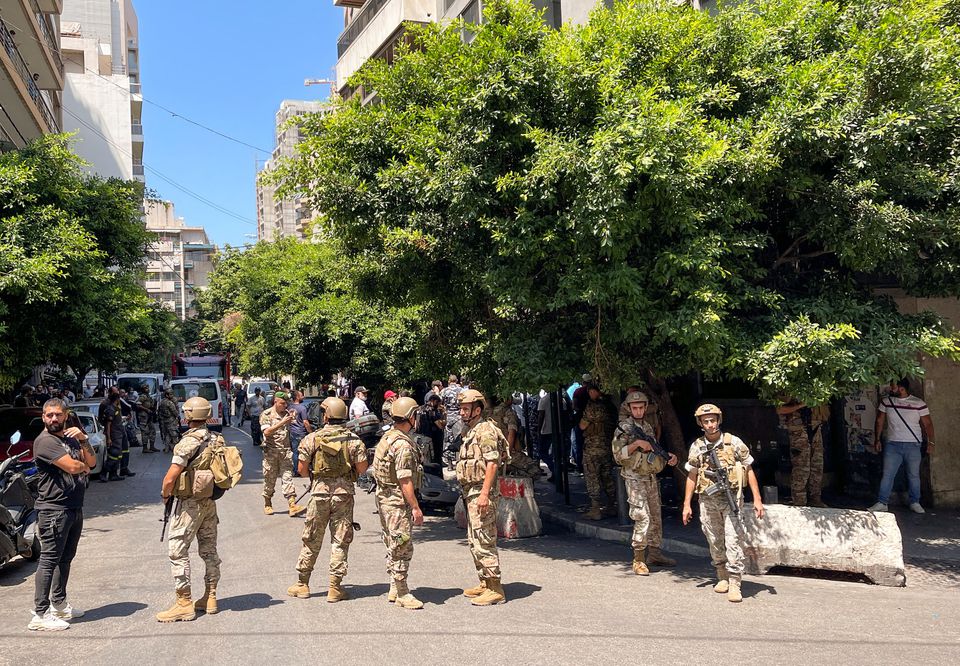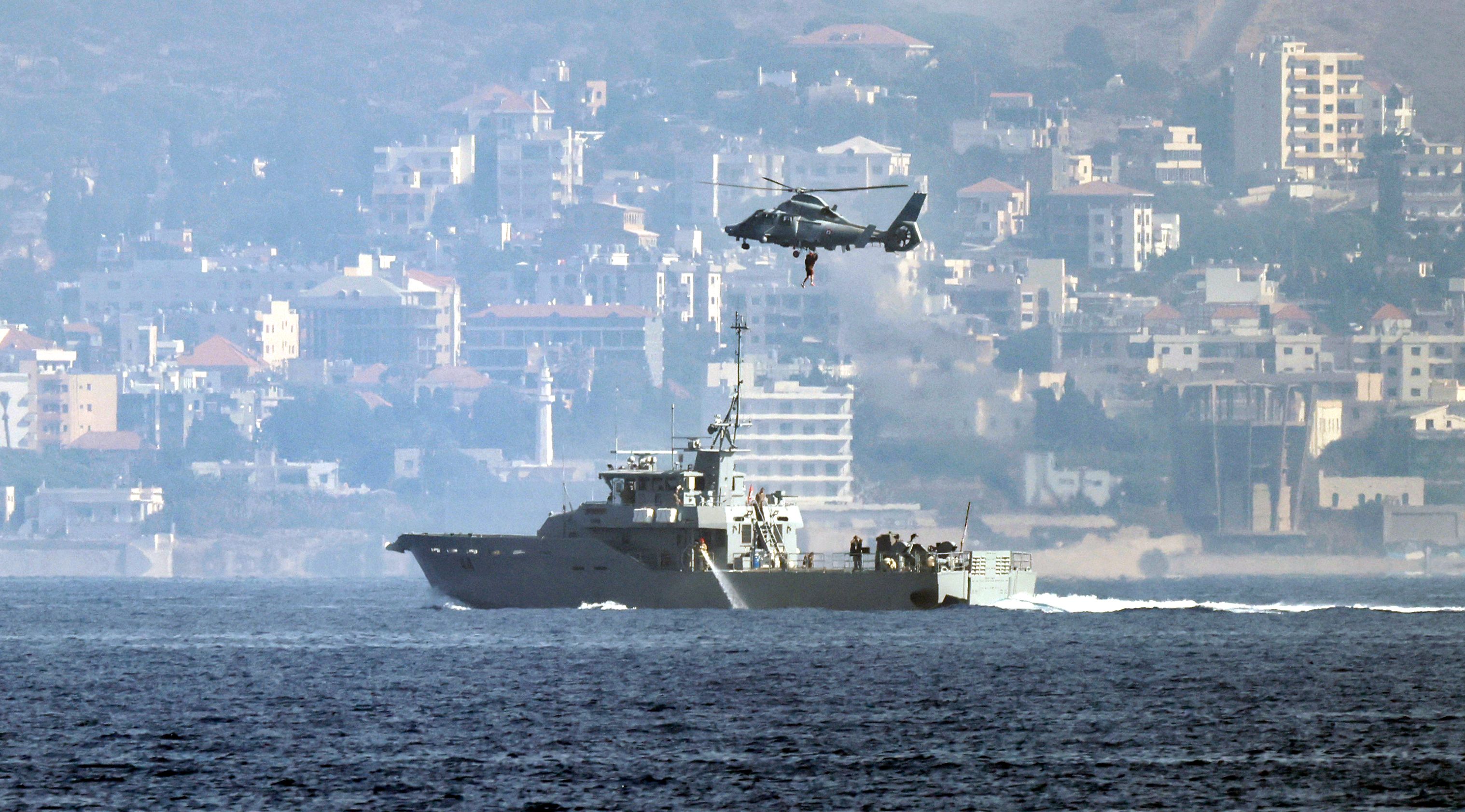BEIRUT (AP) – KAREEM CHEHAYEB — Lebanon’s Parliament on Thursday failed to elect a new president, with the majority of lawmakers casting …

by middleeastmonitor.com -- Issam Naaman -- A semi-orchestrated campaign has been seen in Lebanon over the past week calling for the terms of the 1989 Taif Agreement to be implemented. It has involved government heads, ministers, MPs, religious authorities, leaders of political parties, journalists, social media, and women and men from various organisations, circles, regions and affiliations. But why is this happening now? Is it because the American, French and Saudi Arabian foreign ministers issued a statement in New York about the need to "commit to the Taif Agreement which enables the preservation of national unity and civil peace in Lebanon"? Is there anyone within the Lebanese government who opposes the Taif Agreement or calls for its provisions to be bypassed? Or did the three foreign ministers instruct their allies and supporters of their collective interference in Lebanon's internal affairs to raise this issue at this particularly difficult time? If so, why? I would like to remind everyone, opponents and loyalists alike, that most of the reforms and obligations stipulated in the Taif Agreement are an integral part of the Lebanese constitution. The government of Prime Minister Selim Hoss drafted a law to include the agreement's reforms within the body of the constitution, and the House of Representatives approved it on 21 September, 1990. All we need to move forward is to implement the terms of the existing constitution.
The most prominent reforms legislated an introduction for the constitution and amended 31 articles in the constitution, the most important of which are the following: Article 22, which provides for the election of a Parliament on a national, non-sectarian basis, and a Senate with powers limited to crucial issues. Article 24, stipulating that Parliamentary seats are distributed equally between Christians and Muslims. Article 95, which works to abolish political sectarianism according to a phased plan. Is there a country left in the modern world other than Lebanon where many of the provisions of its constitution have not yet been implemented after more than 32 years? The articles were included because the sectarian quota system in government with all its complexities and corruption was adopted upon the establishment of the State of Greater Lebanon by a decision made by the French colonial authorities in 1920. Moreover, we still see the control and corruption of members of the ruling regimes, and the prioritisation of their own interests at the expense of the general national interests, as well as extreme positions taken by some religious figures and institutions.

BEIRUT, (Reuters) - Lebanon plans to slash its official exchange rate, replacing the 1,507 per dollar rate adopted 25 years ago with a rate of 15,000 in a step towards unifying numerous exchange rates, the finance minister told Reuters on Wednesday. After saying the move would come into effect on Nov. 1, the ministry later said the step was conditioned on the approval of a plan to address the crisis, which is under discussion in parliament. The Lebanese pound has plunged by more than 95% from the official rate since Lebanon fell into financial crisis three years ago, with dollars currently changing hands at around 38,000 on a parallel market. "The goal is for there to be a unification of the exchange rates in Lebanon,"
Finance Minister Youssef Khalil said, calling the decision a "fundamental step" in that direction. The step would come into force on Nov. 1, the ministry said. "Today, Lebanon has entered a new phase and is no longer using an official U.S. dollar exchange rate that makes no sense ... Now we have one that is useful, based on which you can steer the economy toward a better situation," he said.
The decision - which Khalil said was agreed with central bank governor Riad Salameh - marks a milestone in the meltdown that has plunged swathes of the population into poverty in the worst crisis since the 1975-90 civil war. "We have to wait before anticipating further moves," he said. Ruling politicians have so far taken scarcely any action towards tackling the crisis. Unifying the numerous exchange rates operating in the country is one of several conditions set by the IMF for Lebanon to secure a badly needed aid package. The Fund has said this is crucial to boosting economic activity. The IMF said last week progress in implementing reforms remained very slow, with the bulk yet to be carried out.

By Doreen Abi Raad -- cruxnow.com -- BEIRUT — Lebanese Cardinal Bechara Rai denounced the launching of “boats of death” from Lebanon following the drowning of nearly 100 migrants who had attempted to flee the crisis-stricken country. The boat reportedly set off toward Europe Sept. 20 from the port of Miniyeh, near Tripoli, carrying between 120 and 170 migrants and refugees, mostly Syrians, Lebanese and Palestinians. Two days later, it sank in the Mediterranean off the coast of Tartus, Syria, about 30 miles north of Tripoli. “Tragedies have become the daily bread of the Lebanese,'” Rai, Maronite patriarch, said in his Sept. 25 homily at Dimane, the patriarchal summer residence in north Lebanon. “We are appalled by the drowning of … people at sea, boarding boats unfit for long-distance sea crossing,” he said.
Rai lamented “immigration at any cost,” the desperate measures taken by those who embark on a risky, perilous sea journey to escape Lebanon’s suffocating economy with the hopes of a decent standard of living abroad. “The search for life sometimes leads to death,” Rai said. “What is more dangerous is that this tragedy is not the first, so where are the deterrent security measures taken by the state to prevent the boats of death from launching?” the cardinal asked. Earlier in September, at least six people, including children, were killed when a boat bound for Europe from Lebanon sank off the coast of Turkey.
In April, a small migrant boat with dozens of people on board sank off Tripoli. More than 40 people were killed, and many are still missing. “The state is responsible for this tragedy by its inability to get the country out of its economic, financial and social crisis,” Rai said. “We express our heartfelt condolences to the families of the victims, and we ask God to comfort their hearts with the abundance of his mercy,” he said.
Khazen History


Historical Feature:
Churches and Monasteries of the Khazen family

St. Anthony of Padua Church in Ballouneh
Mar Abda Church in Bakaatit Kanaan
Saint Michael Church in Bkaatouta
Saint Therese Church in Qolayaat
Saint Simeon Stylites (مار سمعان العامودي) Church In Ajaltoun
Virgin Mary Church (سيدة المعونات) in Sheilé
Assumption of Mary Church in Ballouneh
1 - The sword of the Maronite Prince
2 - LES KHAZEN CONSULS DE FRANCE
3 - LES MARONITES & LES KHAZEN
4 - LES MAAN & LES KHAZEN
5 - ORIGINE DE LA FAMILLE
Population Movements to Keserwan - The Khazens and The Maans
ما جاء عن الثورة في المقاطعة الكسروانية
ثورة أهالي كسروان على المشايخ الخوازنة وأسبابها
Origins of the "Prince of Maronite" Title
Growing diversity: the Khazin sheiks and the clergy in the first decades of the 18th century
Historical Members:
Barbar Beik El Khazen [English]
Patriach Toubia Kaiss El Khazen(Biography & Life Part1 Part2) (Arabic)
Patriach Youssef Dargham El Khazen (Cont'd)
Cheikh Bishara Jafal El Khazen
Patriarch Youssef Raji El Khazen
The Martyrs Cheikh Philippe & Cheikh Farid El Khazen
Cheikh Nawfal El Khazen (Consul De France)
Cheikh Hossun El Khazen (Consul De France)
Cheikh Abou-Nawfal El Khazen (Consul De France)
Cheikh Francis Abee Nader & his son Yousef
Cheikh Abou-Kanso El Khazen (Consul De France)
Cheikh Abou Nader El Khazen
Cheikh Chafic El Khazen
Cheikh Keserwan El Khazen
Cheikh Serhal El Khazen [English]
Cheikh Rafiq El Khazen [English]
Cheikh Hanna El Khazen
Cheikha Arzi El Khazen
Marie El Khazen